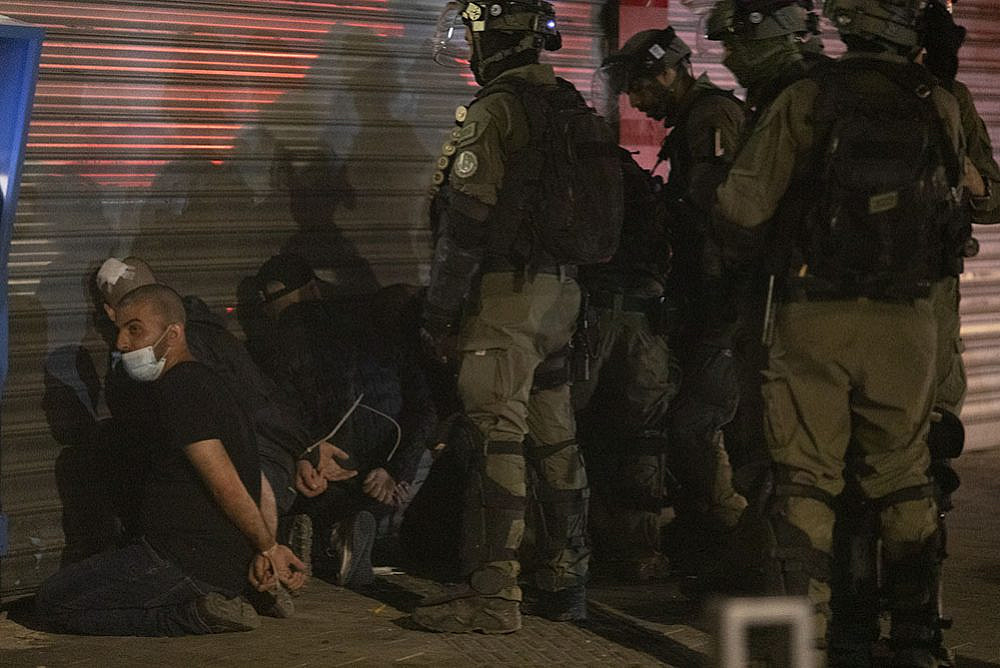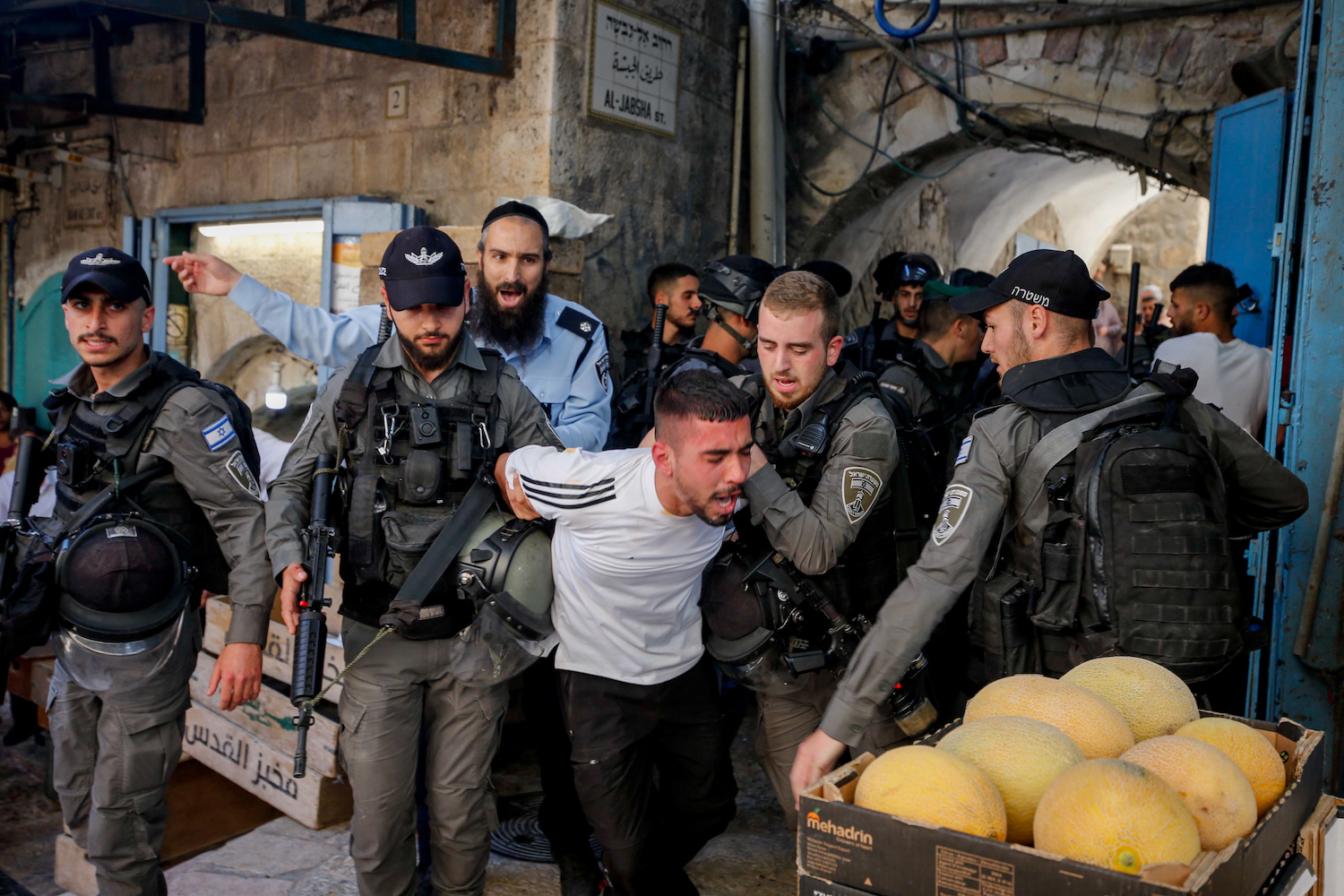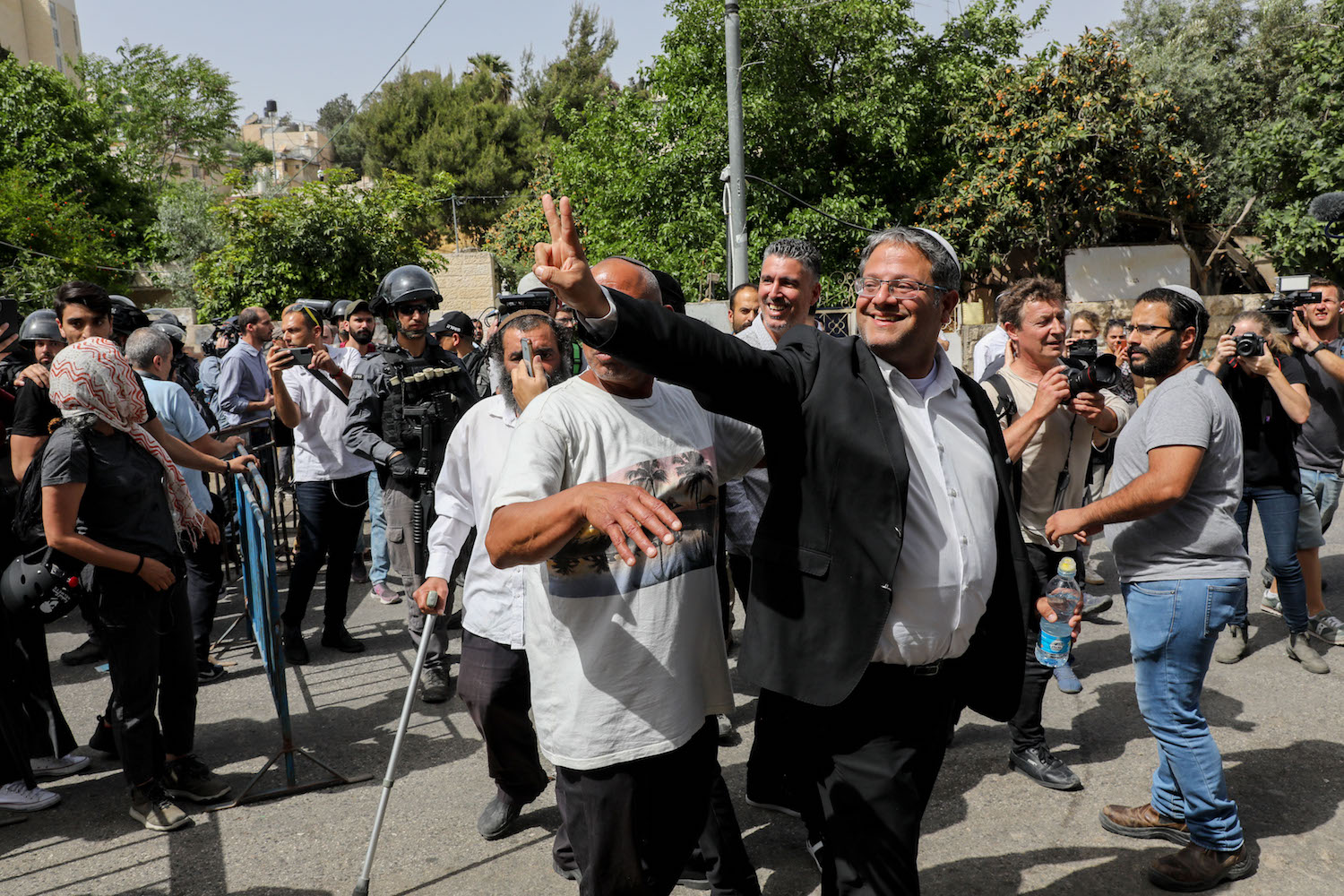Inside Israel’s largest crackdown on Palestinian citizens in decades
The police hoped that arresting thousands of Palestinian citizens would restore dignity to the force. Instead, it only strengthened Palestinian resolve.
 |
The last thing Wafaa Zbeidat ever expected was to be arrested in her own home and forced to spend the night in jail.
Zbeidat, a 40-year-old political activist and mother of four, recounts how Israeli police broke into her home last Wednesday morning. “They didn’t care that I was at home with my children, or that my husband has cancer and is in bad health, that he cannot be left alone for a moment,” she says. “They arrested me in the most humiliating fashion, put me in a cell, and began the interrogation only after six hours. After that, they transferred me to a detention center.”
At midnight, Zbeidat was taken to a courthouse, where a police representative accused her of inciting against the State of Israel during a protest at the entrance to her home village of Basmat Tab’un, in northern Israel. “They said I chanted in support of the shaheeds [martyrs] and demanded that the young people around me film the Arab police officers. The prosecutor didn’t have any video evidence, so the judge left me behind bars until the morning.”
The following day, Zbeidat was once again taken to court, where the judge decided to release her over lack of evidence. “Obviously the goal was to scare and humiliate me, to prevent me from expressing my opinion legally,” she remarks. When she returned home, her husband’s condition had deteriorated, and he had to be hospitalized.
Zbeidat is far from the only person to undergo this experience. Over the past month, raids, arrests, and jail time have become the reality for many Palestinians in Israel — sometimes because they participated in protests, other times because they expressed a political opinion or posted a photo online, and sometimes for no reason at all.
 |
Since the demonstrations began in Jerusalem and in so-called “mixed cities” last month, Israeli authorities have been waging a campaign of violence against Palestinian citizens of the state. After a ceasefire was reached with Hamas in Gaza, Israeli police launched a large-scale arrest operation dubbed “Law and Order.”
The police claim that the campaign’s goal is “to restore deterrence and increase governance in designated places in the State of Israel, along with maintaining the personal security of Israeli citizens.” But activists and lawyers say the operation is an attempt to suppress the current Palestinian uprising.
Since early May, Israeli police have arrested more than 1,900 people across the country, and another 348 since the ceasefire in Gaza. According to human rights groups, those who have been arrested are overwhelmingly Palestinian, with the number of Jewish detainees not exceeding 10 percent. Police Commissioner Yaakov Shabtai decided to extend the operation for another week.
Upon announcing the extension, Shabtai said the authorities have arrested hundreds of suspects and located dozens of weapons. “The purpose of the operation,” the police said in a statement, is to prosecute “those involved in the events, including for possession and trade in weapons, arson, property offenses, and belonging to criminal organizations.”
However, attorneys who are defending the detainees argue that there is no connection between the current operation and the fight against organized crime and the proliferation of illegal weapons in Arab society.
“From the beginning, it was clear that there was a policy of suppressing demonstrations,” says Janan Abdu, an attorney with the Public Committee Against Torture in Israel, who is also part of a group of volunteer lawyers organized by the Palestinian legal center Adalah. Adalah had called on lawyers from all over the country to volunteer to track the arrests, and very quickly, a WhatsApp group was created for each Arab city and village. The initiative was joined by more than 150 attorneys, many of whom spent nearly a week with hardly any sleep.
 |
Abdu says that social media was full of racist incitement by Israeli right wingers these past weeks. Some called for other Jewish citizens to come to Haifa, for example, with posts telling them what to wear and to bring batons rather than knives. “The Palestinians in Haifa went out to protect their homes, vehicles, and property,” she explained. “There was a sense we were approaching a second Nakba and that they would kick us out of our homes. The police arrived, and within five minutes they started violently beating and arresting the Palestinians, all while protecting the right-wing activists.”
Khaled Zbarka, a political activist and a volunteer lawyer from the city of Lydd, argues that the state has no interest in collecting illegal weapons from the criminal organizations operating in Palestinian cities and towns. “The goal is to break us, to frighten Arab society, to turn us into slaves and them into masters,” he says. “This is the meaning of the Jewish state: Jewish supremacy, Arab inferiority, and the Judaization of public space.”
Turning demonstrations into incitement
Most of the Palestinian citizens detained by the police were in their 20s, says Abdu, with some in their 30s. Older Palestinians who were arrested were usually local leaders and public figures, she adds.
According to Abdu, the accusations police have levelled against the detainees do not match their actions. “They would arrest a person, interrogate them over a certain issue, and the next day bring them to court and suddenly accuse them of something else,” she explains. “That is invalid. One cannot file charges over disturbing or assaulting a police officer or throwing stones when the investigation concerns a totally different matter.”
In one case, Abdu recalls, police wanted to extend remand on the grounds that the accused detainee had participated in the demonstration. “But when both the defense and the judges asked ‘When? Which specific illegal protest did he take part in?’ [the police] were unable to answer, so they replied ‘during the month of May.’”
Whereas the initial charges were mostly related to rioting, participating in illegal demonstrations, and stone throwing, she adds, “suddenly the charge sheet included ‘incitement.’ All of a sudden the same person who went out to the street to protect his property is accused of racism and incitement.”
In some cases, the detainees were denied medical treatment. “We arrived at the police station in the first few days and there were 30 detainees,” recalls Abdu. “Six of them needed urgent medical treatment after [the police] used stun grenades and rubber bullets. One of them was beaten and had a hemorrhage in his eye.” Although they needed to be treated, the police still demanded to interrogate them first. Moreover, she says, the detainees were interrogated in Hebrew, even though they have the right to be interrogated in their native Arabic. Some detainees were not even informed that they have the right to meet with a lawyer first.
“We were prevented from meeting with the detainees,” she continues. “One day, I arrived at the police station at 9 p.m. and left at 8:30 a.m. the following morning. There were 38 detainees, and my colleagues and I were only able to meet with eight — we were barred from meeting with the others. We were asked, what organization are you from? And we replied that we do not belong to organizations, we’re volunteers. At one police station they pushed out the lawyers, at others they closed the door and did not let the lawyers in, nor did they answer the phones. In Nazareth, one attorney was even arrested.”
The police even interrogated Palestinian children, sometimes without the presence of their parents. “There was a clear trend of going after minors for the first two days,” says Abdu.
“We saw that they brought a lot of them to court and released them the next day. The judges would release the minors without conditions, or under conditions such as banning them from participating in illegal demonstrations for 30 days, when the prosecution asked for a restraining order and an extension of remand. There were also cases where the judges decided to release the minors, but the prosecution asked for an extension to investigate or submit evidence, and then the judge was forced not to carry out the release, leaving the minors detained for another day.
 |
“They use the same methods as in the West Bank, even the same units,” says Abdu. “Undercover police, Border Police, Shin Bet — they are all used against us. Even the media continued to incite against us. The arrests continue even now. There are arrests in Umm al-Fahem, Reineh, Kufr Kanna, Shefa ‘Amr. Some of the detainees are arrested a second time. Some of the detainees in Haifa were arrested again and released.”
Abdu adds that she will continue volunteering her time defending young Palestinians who have been arrested over the past weeks. “This week we gave lectures in Haifa on the rights of detainees, and I will give a lecture in one of the high schools where one of the students was arrested and indicted. I feel that we as a society are evolving, learning, and improving over time. Social networks have helped a lot, and we learned to use them. We are more prepared for an emergency.”
The police refused to address allegations of misconduct at the time of the arrests, and did not respond to our query over whether any investigations are being conducted into the matter nor our request for a breakdown of specific cases of police misconduct.
‘If you interrogate anyone, interrogate your political leadership’
Mu’tasim Taha is a photographer from the village of Daburiyya in northern Israel. He recently participated in activities to raise cultural awareness in the village, which included lectures by journalists, lawyers, activists, and Knesset members. Taha was arrested last Tuesday and released the following day. A week before his arrest, he received threats from someone in the Israeli security service demanding the village put an end to the cultural activities.
“When the operation began, at 2 a.m. last Tuesday, we were surprised by masked men in civilian clothes who stormed the house and frightened my mother and the whole family,” Taha recalls. “Five people entered my room. Then an officer from the [local] station arrived, and another officer told me in Arabic: ‘You see how we’ll get you.’ He began threatening me, while mentioning the names of young people from my village.”
“Then they arrested me,” Taha continues. “They pulled out a weapon in front of my brother and his wife fainted. They tried to threaten my family members.”
“I was arrested along with another young man from the village. We stayed one night at the police station and then they extended my detention and took me to Tzalmon Prison on suspicion of burning tires.” Both men were released after the prosecution could not provide any evidence to back its claim that any tires had been burned at the protest.
“What is happening is a ridiculous farce,” says Rafi Masalha, an attorney representing the two young men. “The police are fabricating suspicions and arresting young people in a humiliating way. These are attempts whose purpose is clear: to frighten young people, their families, and society at large. For 73 years they have been investing money to harm the [political] awareness of Arab society, and now they have discovered that the new generation has a national consciousness.”
Rashad Omri, a journalist from Haifa, was also arrested last week, and released a day later without any conditions. He also describes how large forces from the Shin Bet stormed his house and arrested him. “I was told [by police] that I had incited to murder Jews. I asked them who was the fool who told them this. They left me in custody for long hours before I was transferred to court. There, Judge Tadmor Zamir told them she had looked at the investigation file, couldn’t find any evidence for the charges, and ordered my release.”
Omri says that a police investigator tried to offer him a deal according to which he would leave Haifa for two weeks in exchange for a plea bargain, but that if Omri refused, the investigator would ask to extend his detention by 100 days. “I refused and told him that those who should leave Haifa are the fascist extremists who came to attack the Arab citizens in the city.”
“It is clear that these are arrests of people who have an impact on society,” says Maher Talhami, a lawyer representing both Omri and Wafa Zubeidat. “It is an attempt to humiliate and intimidate. But the reaction is the opposite of what they expected. They expected that the arrests would stir fear in Arab society, but they only caused more rage.”
The police offered the following response to the testimonies by Zubeidat, Omri, and Taha: “The police are investigating the disturbances without any discrimination, regardless of the identity of the suspects or the victims. We will continue to investigate objectively in order to bring the suspects to justice.”
Murad Haddad, a political activist and a council member in the Shefa ‘Amr municipality was arrested during the police operation, alongside two other members of the left-wing Hadash party, which is one of the factions in the Joint List. “I was detained for four days and interrogated for five minutes. They wanted to scare me and the people in the city, and thought that this would calm things down.”
 |
“I was asked. ‘Are you responsible for organizing the violent demonstrations?’ I answered no. I said that if you really want to know who is responsible for the demonstrations, it is Itamar Ben Gvir who set up his tent [to support the settlers in Sheikh Jarrah], Benjamin Netanyahu who gave permission to the [far right group] Lehava to march in Jerusalem, and the police commissioner who sent officers to Al-Aqsa. If you need to interrogate anyone, interrogate your political leadership.”
Haddad was initially released with a five-day ban from the city, which was then overturned by a judge.
‘Palestinians are no longer the minority’
Haddad describes how the demonstrations in Shefa ‘Amr began following the events in Sheikh Jarrah. “We held a rally of support and solidarity… We were surprised by the number of people who came. I have been active for more than 30 years and have a lot of experience in demonstrations. The number of people who participated was larger than usual. I realized something big was happening.”
The rally, which took place near town hall, was relatively quiet, says Haddad. The police did not come that day, but Haddad did see hundreds of new faces, many of them young people, at the demonstration.
“The young people who took part in the demonstration organized another one the next day,” Haddad continues. “There were no political bodies involved. The next day even more people came. We marched in the city and more people joined. A thousand people. It looked like a popular uprising.” Sensing the police response, Haddad knew the activists would have to prepare, and began setting up WhatsApp groups with local lawyers and doctors, as well as an emergency committee.
“We are not ‘Israeli Arabs,’ as Israel has been trying to make us for 73 years,” Haddad says. “We have always said that we cannot be disconnected from our people and our identity. Our Palestinian identity cannot be stolen from us. I am not proud of my Israeli identity card. I am Palestinian. If something happens in Jerusalem, it will happen in Gaza, Shefa ‘Amr, Haifa, the refugee camps in the Arab world, and the West Bank. It is not natural for Gaza to be shelled and for people in Shefa ‘Amr to sleep soundly as if nothing happened.”
“We must not back down,” Haddad concludes. “Our demands must be great, rather than compromises. We will talk about a state of all citizens. We understood that we have power. Once the Palestinians in Jaffa, Acre, Shefa ‘Amr, and Lydd go back to being part of the Palestinian people, our power will only grow. We are no longer a minority, we are the majority. That’s what has been driving the country crazy.”


No comments:
Post a Comment
Note: only a member of this blog may post a comment.